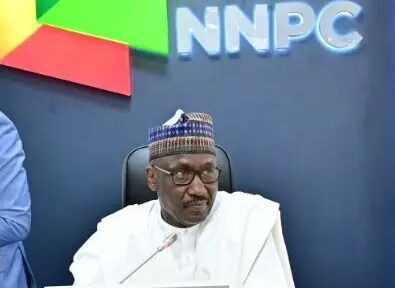Business
NNPC Struggles with Worsening Fuel Scarcity as Black Market Thrives

The NNPC faces challenges in managing the deepening fuel scarcity, leading to a booming black market across the country.
On Sunday, the black market for Premium Motor Spirit (PMS), commonly known as petrol, flourished while the Nigerian National Petroleum Company Limited made a commitment to eliminate queues at fuel stations by Wednesday.
Some industry observers have cited the alleged $6.8bn debt owed by international oil traders as a significant factor in Nigeria’s widespread PMS shortage, but NNPC refuted these claims and asserted that they did not owe anything to the aforementioned parties.
Despite the assertion of the national oil company that petrol queues would dissipate this week, on Sunday, fuel distributors reported that there had been no improvement in product loading at depots.
The black market dealers who sold petrol in containers saw an opportunity and charged exorbitant prices ranging from N1,200 to N1,500 per litre depending on the location of purchase.
The sole importer of the commodity (NNPC) attributed the petrol scarcity to challenges in evacuating PMS vessels.
Due to their inability to access the required United States dollar for petrol imports, other dealers have ceased importing the commodity. As a result, NNPC is currently Nigeria’s sole importer of petrol.
One of our correspondents was informed by Olufemi Soneye, the Chief Corporate Communications Officer at NNPC, that efforts are being made to address fuel supply issues. He emphasized that queues should dissipate by mid-week.
On Sunday, Soneye stated that the vessel’s evacuation challenge in Apapa (Lagos ports) was being addressed and resolved. He expressed certainty that fuel scarcity would be eliminated by Wednesday.
Afterwards, he released a press release addressing the issue and expressing regret on behalf of NNPC Ltd for the scarcity of fuel in certain areas of Lagos and FCT (Federal Capital Territory), citing difficulties with distribution as the cause.
The company is actively encouraging motorists to avoid panic-buying and assures them that it is collaborating with relevant stakeholders non-stop in order to restore regular operations.
According to a representative from one of the leading petroleum enterprises in Nigeria, their company has depleted its stock.
The official, who requested anonymity due to a lack of authorization to discuss the matter publicly, stated that there is currently no stock available for us and many depots in Apapa.
The oil marketer revealed that the shortage of supply in Lagos could exacerbate during the week due to no signs of improvement.
According to the marketer, while there have been no changes yet, scarcity in Lagos may worsen during the week. Motorists can still purchase the product but at an exorbitant cost.
According to a depot operator, while depots will receive supplies this week, it won’t be sufficient to satisfy the expected demand and alleviate the fuel crisis.
As of Friday, the manager at a filling station in Abeokuta, which is the capital city of Ogun State stated that N880 was the cost for one litre of petrol.
According to the manager, Adeyanju, his principal had been unable to obtain fuel since Friday due to private depots raising petrol prices.
The National Publicity Secretary of the Independent Petroleum Marketers Association of Nigeria, Chief Ukadike Chinedu, stated that in addition to other existing challenges facing the downstream oil sector, the recent nationwide hunger protests have made matters worse.
He stated that the recent protests had a negative impact on activities in the downstream oil sector, and combined with insufficient supply of petrol, it has been a challenge to resolve these issues.
Indebtedness is denied by NNPC.
On Sunday, the national oil company declared that it does not have a debt of $6.8bn to international oil traders in another parallel progress.
Denying allegations of non-remittance into the federation account since January, the company clarified that funds have been duly remitted.
In a statement, Soneye responded to various accusations levied against the government-owned energy company.
Allegedly, NNPC was in debt to some suppliers due to being the exclusive petrol importer of Nigeria. However, Soneye admitted that these transactions were conducted on a credit basis.
There is no outstanding $6.8bn debt owed by NNPC Ltd to any international trader(s). Given the nature of credit-based transactions in the oil trading industry, occasional indebtedness is a regular occurrence.
Soneye stated that NNPC Ltd, via its subsidiary NNPC Trading, holds multiple active trade credit lines with various traders. The company is fulfilling its related invoice payments in the order they were received – first come, first served.
He failed to disclose the present financial responsibilities that NNPC is addressing.
Regarding remittances, he stated that “It is inaccurate to claim that NNPC Ltd has failed to remit any funds to the federation account since January. Regularly, NNPC Ltd and all of its subsidiaries pay their taxes promptly to the Federal Inland Revenue Service.”
Furthermore, NNPC Ltd makes payments for CIT (company income tax) to road contractors via the Road Investment Tax Credit Scheme. As a result, it is notable that NNPC Ltd ranks as the highest contributor toward monthly tax revenue distribution at the Federation Account Allocation Committee.
According to Soneye, the NNPC does not act as a regulator and is also not involved in maintaining the quality of imported fuel.
The NNPC Ltd has no involvement in regulating the quality or quantity of imported petroleum products. The Nigerian Midstream and Downstream Petroleum Regulatory Authority is an independent agency responsible for overseeing these matters, and does not report to the NNPC Ltd as it operates separately.
He clarified that the NNPC does not object to media queries on matters related to its activities and surroundings, which can then be shared with the public through print or electronic means of communication.
Soneye stated that the company is always willing to present factual information on any subject matter. He emphasized that this aligns with the Transparency, Accountability, and Performance Excellence philosophy introduced by Mele Kyari’s administration since assuming office in 2019.
